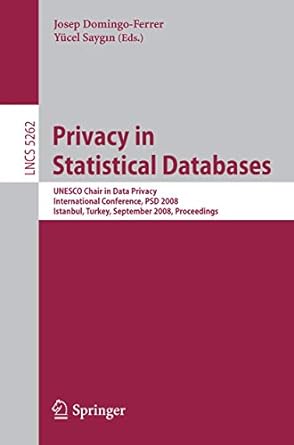Question
Suppose we toss darts randomly at a square dartboard, whose bullseye is at the origin, and whose sides are 2 feet in length. Suppose also
Suppose we toss darts randomly at a square dartboard, whose bullseye is at the origin, and whose sides are 2 feet in length. Suppose also that theres a circle inscribed in the square dartboard. The radius of the circle is 1 foot, and its area is pi square feet. If the points that are hit by the darts are uniformly distributed
(and we always hit the square), then the number of darts that hit inside the circle should approximately satisfy the equation: number in circle/total number of tosses = pi/4
since the ratio of the area of the circle to the area of the square is pi/ 4. We can use this formula to estimate the value of pi with a random number generator:
number_in_circle = 0;
for (toss = 0; toss < number of tosses; toss++) {
x = random double between -1 and 1;
y = random double between -1 and 1;
distance squared = x*x + y*y;
if (distance squared <= 1) number_in_circle++;
}
pi_estimate = 4*number_in_circle/((double) number_of_tosses);
This is called a Monte Carlo method, since it uses randomness (the dart tosses). Write an OpenMP program that uses a Monte Carlo method to estimate pi, Read in the total number of tosses before forking any threads. Use a reduction clause to find the total number of darts hitting inside the circle. Print the result after joining all the threads. You may want to use long long int s for the number of hits in the circle and the number of tosses, since both may have to be very large to get a reasonable estimate of pi.
Step by Step Solution
There are 3 Steps involved in it
Step: 1

Get Instant Access to Expert-Tailored Solutions
See step-by-step solutions with expert insights and AI powered tools for academic success
Step: 2

Step: 3

Ace Your Homework with AI
Get the answers you need in no time with our AI-driven, step-by-step assistance
Get Started


